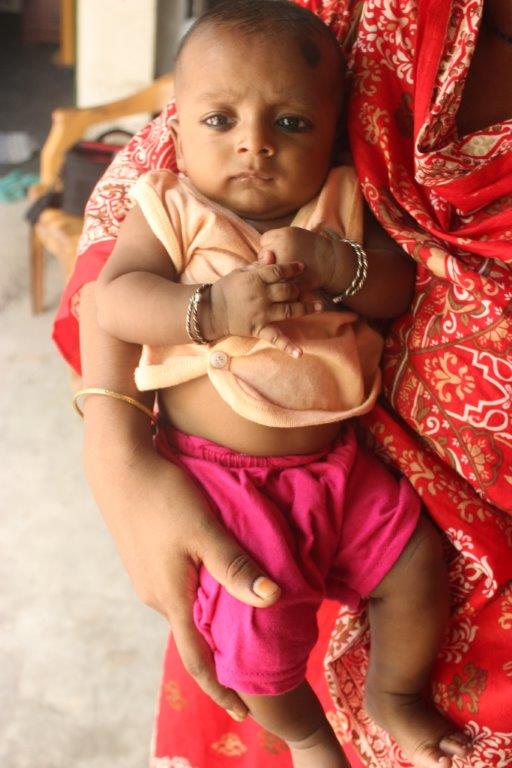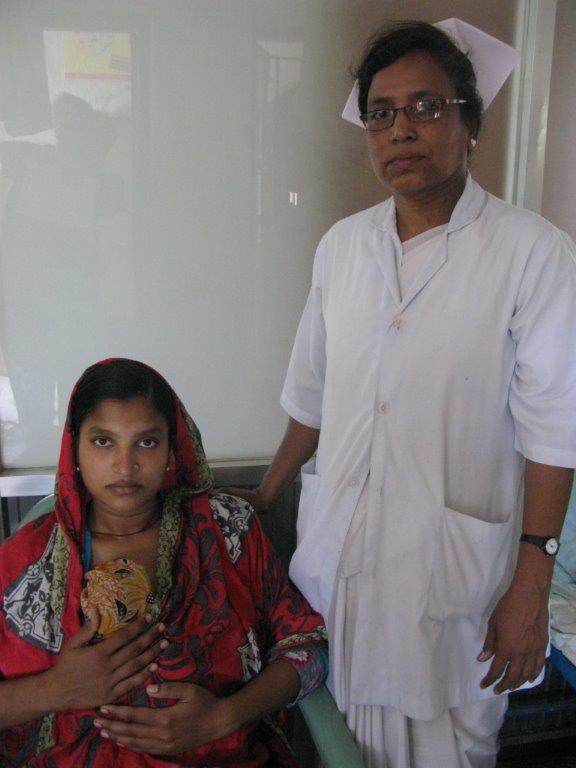By Sohrab Hussain, Save the Children Bangladesh
Mossammat Nipa, age 18, gave birth to her first child, Omar, eight weeks early in Khoksha hospital in Bangladesh’s Kushtia district. Although he weighed just 1,740 grams (3.8 pounds), Omar’s doctors determined he was clinically stable. To help Omar get through the dangerous first days, the attending doctor and nurse introduced the concept of kangaroo mother care, or KMC. They explained to Nipa the importance of keeping the baby in skin-to-skin contact and feeding exclusively with breastmilk. Nipa and Omar were shifted to the KMC corner of the hospital to practice the technique.
With the help of Senior Staff Nurse Konica Rani, Nipa placed Omar on her chest in the KMC position. This ensured that the tiny baby would be warm and able to feed comfortably. Nipa’s mother and mother-in-law were allowed to stay with Nipa in the hospital. They supported her by helping keep the baby in the KMC position, allowing Nipa to do essential activities as well as get some rest.
After 10 days, Nipa and Omar were discharged, but Nipa continued to provide KMC to Omar. She returned to the hospital for follow-up care four times but continued KMC until Omar began squirming out from her chest on his own.

Four months after leaving the hospital, Omar and Nipa are now healthy and at home, with Omar weighing 7 kg (15.4 lbs). Nipa said, “I feel great [about KMC] because Omar is now well,” adding, “I definitely will advise my neighbors to go to the hospital to have KMC if their babies are born small.”
Nurse Rani said, “I am happy because I am now capable to give KMC service. Earlier we could not save lives in such cases. All babies here who have received KMC have remained well and healthy.” The hospital’s medical officer, Dr. Sudip Kumar Dey, added, “We used to refer [such cases] to the higher level hospital, [but] now we can provide services here.”
Each year an estimated 400,000 mothers in Bangladesh deliver preterm babies, and just over 30 percent of all neonatal deaths in the country are due to complications of preterm birth. Yet most of these deaths are preventable with interventions like KMC.
The Khoksha Upazila Health Complex where Omar was born is a 50-bed hospital in Kushtia district. Its 15 doctors, 12 nurses, and number of paramedics provide a range of health services. However, until recently there were no options for preterm newborns, so they were referred to Rajshahi Medical College Hospital, which was not always accessible because of distance, cost, or other factors. Now with the ability to provide immediate care to preterm babies, Khosksha is helping Bangladesh meet its commitment to reducing neonatal deaths and giving all babies a healthy start to life.
KMC is an evidence-based and highly effective intervention to manage low birthweight or preterm babies. The continuous skin-to-skin contact between the newborn and the mother (or other family members) helps the baby maintain warmth, facilitates breastfeeding, helps prevents infections, and strengthens the child-parent bond.
Save the Children’s Saving Newborn Lives (SNL) program is providing technical and catalytic support to the Ministry of Health & Family Welfare for development of policies, guidelines, training materials, and monitoring tools. SNL supports establishment of “KMC corners” in different national institutes in Dhaka and district and sub-district facilities in Kushtia, including Khoksha, where the Ministry trained doctors and nurses in KMC and oriented service staff in the facility. SNL is also supporting social behavior change communication measures to increase community awareness of and demand for services for preterm babies.
